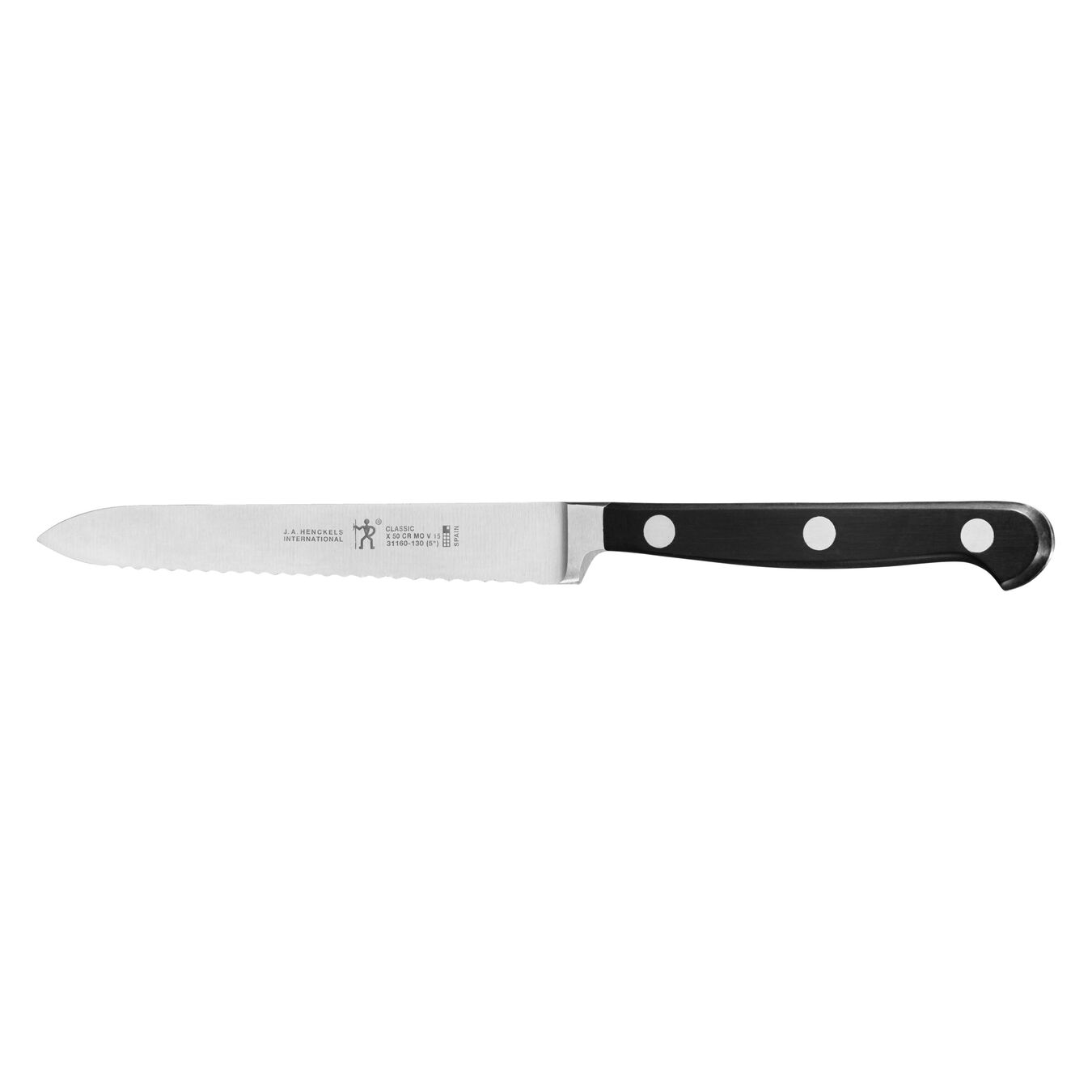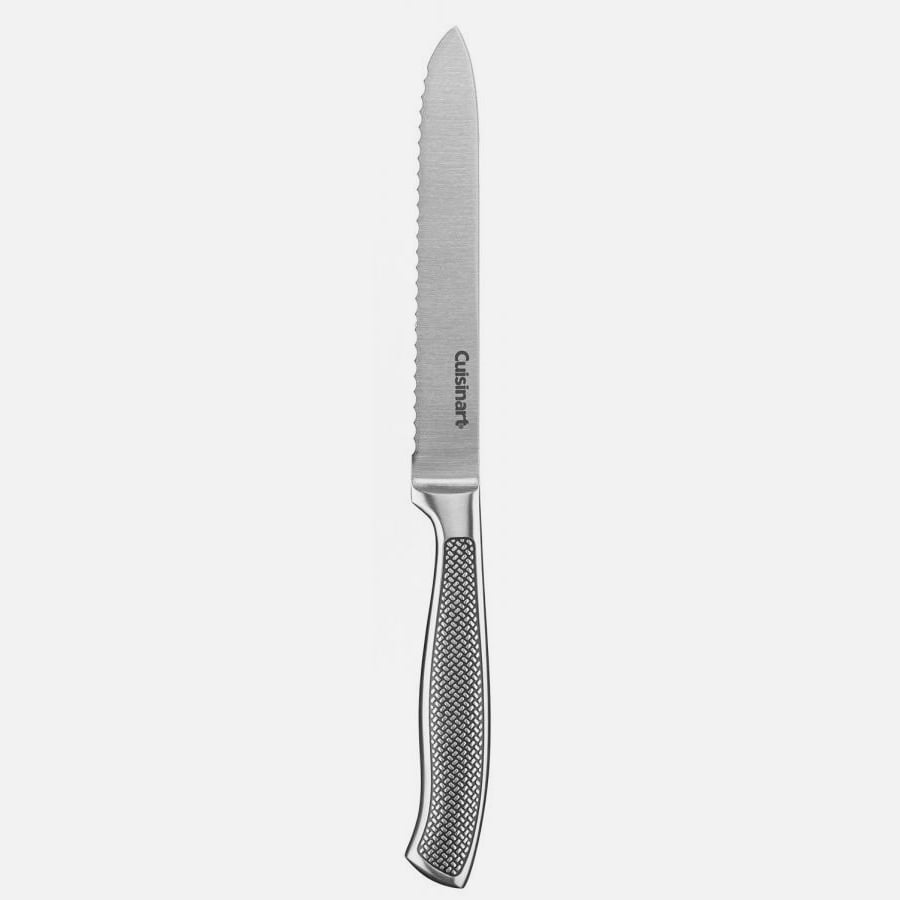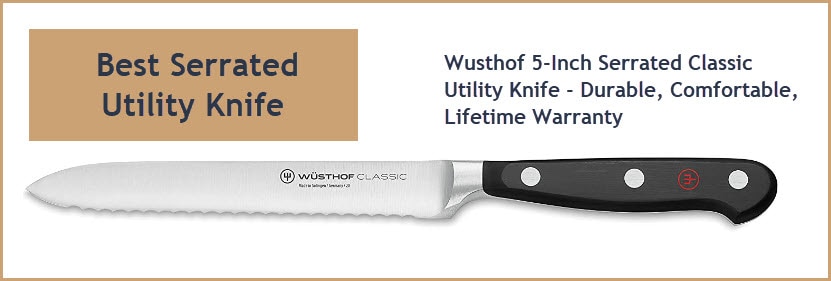Whether you’re a new home cook or a professional chef, knives impact the enjoyment and quality of cooking. There is no one-size-fits-all approach to finding your perfect knife. Your choice may vary depending on your skill level, intended use, budget, and maintenance goals. With so many different products on the market, it can be difficult to compare options. That’s why we compiled a list of the 6 best serrated utility chef knives with prices ranging from $10 to $120 to simplify your research.
Our top choice is the Wusthof 5-inch serrated classic utility knife however, your choice will depend on your needs and preferences.
Top 6 Serrated Utility Knives
  Editor's Choice Editor's Choice | ||||
 | ||||
 Best Budget Serrated Utility Knife | ||||
 Best Japanese Serrated Utility Knife | Price | |||
 | Price | |||
 | Price |
1. Wusthof 5-Inch Serrated Classic Utility Knife – Editor’s Choice
The Wusthof 5-Inch Serrated Classic Utility Knife is the editor’s choice because of its overall glowing reviews, best rank, and best quality for the price.
This all-purpose knife is useful for a variety of tasks including chopping, mincing, slicing, and dicing. It is suitable for all users including home cooks and professional chefs. It may be more expensive than some other knives on the list, but it is well worth the investment.
Wusthof 5-Inch Serrated Classic Utility Knife
About the Knife
Its HRC is 58, which means that it is high quality and retains sharpness for a long time. However, it is not as sharp as top-qualify chef’s knives (typically 60 and above). This should be sharp enough for most home cooks, but if you’re an expert chef who’s looking for an extremely precise blade, it may not be the right choice for you.
This serrated utility knife is well-balanced, comfortable to use, ergonomic, has a full tang, and has a durable stainless steel blade. The stainless steel is also resistant to stains and corrosions, making it easier to maintain.
Maintenance and Cleaning
This knife is not dishwasher safe and should instead be hand washed. Clean the knife with warm water, a damp cloth, and dishwashing soap. Rinse and dry the knife immediately after.
This knife should be honed every few uses and sharpened once a year or so. It should not be sharpened too often as this process removes steel from your blade. Wusthof recommends that you use sharpeners and honers from the same brand as your knife to ensure they are the correct hardness. The Wusthof 5-Inch Serrated Classic Utility Knife can be sharpened with a steel sharpening rod and honed with a steel honing rod.
Wusthof sell sharpeners and honing steel which you can find here.
Watch the video for specific instructions on how to hone a serrated Wusthof knife:
Pros:
- Durable
- Comfortable
- Lifetime warranty
Cons:
- Pricey
- Not the sharpest
2. Henckels Classic 5’’ Serrated Utility Knife
The Henckels Classic 5” Serrated Utility Knife is a mid-range knife made from high-quality German stainless steel.
Henckels Classic 5’’ Serrated Utility Knife Specifications
About the Knife
This knife is most suitable for cutting foods with hard exteriors and soft interiors such as fruits, vegetables, sausages, bread, and cheese. The small size and versatility make it perfect for bringing along to picnics.
The knife is well-balanced with a full tang and an ergonomic, triple-rivet handle for extra comfort. Its HRC is 57, which is less sharp than high-end chef’s knives but perfect for a home cook. The stainless steel blade is durable and resistant to stains and collisions. Henckel knives are a good value for the price, but they are not built to last as long as higher-end knives like Wusthof.
Maintenance and Cleaning
This knife is dishwasher safe. However, it can be damaged if it collides too much with other objects in the dishwasher, so make sure to put it on a dish rack rather than with the other utensils. The safest option is just to handwash it with warm water, dish soap, and a sponge.
You can sharpen your knife using a Zwillings or Henckels brand steel sharpening rod. You only need to sharpen it once every year or two if you notice it is getting dull. Hone your knife every few uses using a Zwillings or Henckels steel honing rod. You can find the proper tools here.
Pros:
- Versatile
- Good value
- Easy to clean
Cons:
- Mid-range durability and materials
3. Zwilling J.A. Henckels 5’’ Serrated Utility Knife – Best Budget Serrated Utility Knife

The Zwilling J.A. Henckels 5’’ Serrated Utility Knife is our choice for the best budget serrated utility knife.
Zwilling J.A. Henckels 5’’ Serrated Utility Knife Specifications
About the Knife
It’s lightweight, easy to hold, and perfect for cooks who value quality for a lower price. This product is bested suited for slicing foods with soft interiors like bread, cheese, and tomatoes.
Zwilling and Henckels are both owned by the same company, but Zwilling is the more high-end version because it uses higher quality materials. This knife is perfectly balanced, so it cuts more precisely and is easy to control. The high carbon stainless steel blade combines the perks of both stainless steel and carbon steel, so it’s durable, sharp, and resistant to stains, rust, and corrosion. The blade is flexible, which may be a pro or a con depending on your intended use. Flexible blades allow for more precise, clean cuts but can cause injury if used on tougher foods.
This knife has a full tang with an exposed tang on an ergonometric handle. Its HRC is 57, which is great for a home cook but may not be sharp enough for a professional chef.
Maintenance and Cleaning
This knife is not dishwasher safe. Wash it by hand using mild dish soap, lukewarm water, and a non-scratch sponge or cloth, and dry it immediately.
Sharpen the Zwilling knife every few months if it starts to get dull and hone it every few uses. To sharpen, use a Zwilling steel sharpening rod with the angle between the blade and the rod at about 15 degrees. Zwilling sells sharpening and honing rods here.
Pros:
- Flexible
- Perfect balance
- Quality materials
Cons:
- Less sharp
4. Shun Classic Knife, 6 Inch, Serrated Utility – Best Japanese Serrated Utility Knife
The Shun Classic 6’’ Serrated Utility Knife, manufactured in Japan, is the sharpest and most expensive knife on our list.
Shun Classic Knife, 6 Inch, Serrated Utility Specifications
About the Knife
This knife is most suitable for slicing soft foods with tough exteriors such as avocados, tomatoes, cheeses, and charcuterie. We recommend it for a serious chef who wants a top-quality knife and will put in extra effort to carefully handle and maintain it.
Japanese knives are generally lighter and sharper than knives manufactured in Germany and elsewhere. This knife is no exception. It has a 69-layer Damascus blade with a professional-grade HRC of 62-64 and is slightly flexible. It’s well-balanced and easy to hold with a full tang and Pakkawood handle that is suitable for both right and left-handed cooks. However, Japanese knives tend to be less durable than German knives because they are designed to prioritize sharpness.
Maintenance and Cleaning
This knife is not dishwasher safe. Always hand wash right after use with mild dish soap, lukewarm water, and a soft cloth and dry immediately. The knife requires careful handling as the extra sharp Japanese blade is more prone to chipping and breaking. The Pakkawood handle should also be treated with care and cleaned in the same way as the blade. Never soak the knife in water, as this can cause damage.
This knife needs to be sharpened once or twice a year at most, depending on how often you use it. Shun offers free mail-in and walk-in professional sharpening services. Request free sharpening here. Additionally, you should hone the knife every few uses. Shun sells sharpening and honing tools here.
Pros:
- Sharp
- Premium quality
- Beautiful design
Cons:
- Pricey
- High-maintenance
5. Zelite Infinity 5.5’’ Serrated Utility Knife
The Zelite Infinity 5.5’’ Serrated Utility Knife is extremely versatile and sharp for the price point. It is most suitable for cutting soft produce with waxy exteriors, meat, cheese, bread, cake, and sandwiches.
Zelite Infinity 5.5’’ Serrated Utility Knife Specifications
About the Knife
This knife works for people of all skill levels, including home cooks and professional chefs. It is well-balanced with a full tang. The Damascus high carbon stainless steel blade is exceptionally sharp with an HRC of 60-62 and resistance to stains, rust, and coercions. The ergonometric handle is easy to use with a comfortable grip.
Maintenance and Cleaning
The sharp Japanese blade is more prone to chipping and breaking and requires careful handling. It is not dishwasher safe and can be hand washed with lukewarm water, dish soap, and a soft towel. Do not leave the knife submerged in water, as this can cause damage.
You should hone your knife regularly and only sharpen it occasionally with a steel sharpening rod. You can purchase a Zelite honing rod here. For more information on proper care and storage, read this.
Pros:
- Sharp
- Inexpensive for Damascus steel
Cons:
- Less durable
6. Cuisinart C77SS-5SUT Graphix 5’’ Serrated Utility Knife
The Cuisinart C77SS-5SUT Graphix 5’’ Serrated Utility Knife is the most affordable option on our list. It’s perfect for anyone with a lower budget or for newer cooks who are not yet ready to invest in an expensive knife.
Cuisinart Graphix 5’’ Serrated Utility Knife Specifications
About the Knife
This knife is balanced with textured handles for easy, comfortable cutting. It is best suited for cutting bread, soft fruits, and vegetables. The blade is inflexible and made of high-carbon stainless steel, so it’s durable and resistant to stains and corrosion. The knife has a full tang and even comes with a lifetime warranty. Its HRC is unknown, but we think this knife is sharp enough for a beginner cook.
Maintenance and Cleaning
This knife is not dishwasher safe. It can be washed by hand with lukewarm water, dish soap, and a towel or sponge.
You can sharpen and hone the knife using this Cuisinart multipurpose steel rod.
Pros:
- Inexpensive
- Good value
Cons:
- Unknown HRC
- Lower quality
FAQ
What Is a Serrated Utility Knife Used for?
A serrated utility knife is a knife used for foods with delicate textures that might get crushed by a plain blade. It’s shorter and sharper than a bread knife, which makes it ideal for fruits, vegetables, cheeses, and smaller pieces of bread and sandwiches.
How to Sharpen a Serrated Utility Knife?
Sharpening a serrated utility knife requires a different technique to sharpening your plain-edge knives. This task requires a sharpening rod that tapers off to a small point. Here’s how to sharpen a serrated blade:
- Hold the sharpening rod in your dominant hand and the knife in the other. Hold the knife on its side with the serrations pointing away from you and the rod over the blade at an angle with the point resting in the serration that you want to sharpen.
- Push the sharpening rod away from you so it slides through the serration from the point up to the thicker part of the rod, stopping when it reaches the same width as the serration (going past this point can damage the blade).
- Repeat this a few times until a bur develops. A bur is a tiny strip of steel that sticks up from the blade when it is sharpened. You may not be able to see it, but you can check that it’s there by gently touching the serration with your finger or fingernail. A bur means that the serration is fully sharpened.
- Remove the bur by running the knife back over the sharpening rod on the opposite side of the blade a few times to push the bur back into place.
Watch this video for a visual knife sharpening guide. Click here for a video on how to hone serrated knives.
Conclusion
Choosing the right knife is a highly personal decision that depends on factors such as budget, maintenance, and your cooking goals. Our top choice is the Wusthof 5-Inch Serrated Classic Utility Knife because of its reviews, quality, and value for the price. However, all the knives on this list are great options to consider based on your needs.






Post Your Thoughts